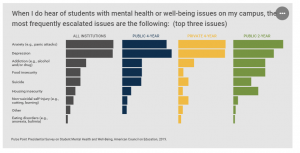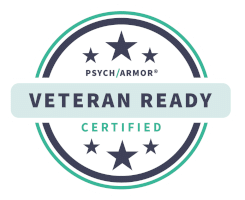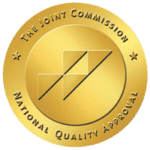
Depression in College
According to the World Health Organization, depression is the leading cause of ill health and disability worldwide and is one of the most prevalent problems across the nation’s college campuses. Depression is a mood disorder that can cause one to have persistent feelings of sadness and lack of interest in activities and friends lasting for at least two weeks or longer. Unlike feeling down, someone with a depressive disorder can’t just snap out of it. Depression can take a toll on a student’s academic performance as it can affect their ability to work, study, interact with others, and even take care of themselves.
Signs and symptoms of depression in college students (Mayo Clinic):
- Feelings of sadness, tearfulness, emptiness or hopelessness
- Irritability, frustration and even angry outbursts, out of proportion to the situation
- Loss of interest or pleasure in most or all normal activities
- Sleep disturbances, including insomnia or sleeping too much
- Tiredness and lack of energy, so even small tasks take extra effort
- Changes in appetite — often reduced appetite and weight loss, but increased cravings for food and weight gain in some people
- Negative changes in academic performance
- Unexplained physical problems, such as back pain or headaches
- Anxiety, agitation or restlessness
- Feelings of worthlessness or guilt, fixating on past failures
- Trouble thinking, concentrating, making decisions and remembering things
- Frequent or recurrent thoughts of death, suicidal thoughts, suicide attempts, or suicide
College is a time full of change, which is key in triggering depressive and anxiety symptoms. As each young adult adjusts to the transition many factors come into play that affects their mental health, such as:
- Homesickness
- Sleep disruption
- Drinking excessive caffeine
- Loneliness
- Academic pressures
- Adjusting to new roommates
- New schedules and workloads
- Money issues
How can you deal with depression?
You can’t just snap out of depression, but you can do things to help yourself.
- Be proactive. The transition to college can often mean placing self-care on a back burner. By making sleep, regular exercise, and eating healthy a top priority, students can reduce stress and anxiety levels and increase energy.
- One thing at a time day at a time. As we have said, college can be overwhelming, and increased anxiety can exacerbate depressive symptoms. Avoid doing too many things at once by breaking up large tasks into smaller ones. Try different time management methods and see what works best and break up large tasks into smaller ones.
- Take breaks. When you feel worried, anxious, or sad, find a relaxing activity. Do something that you enjoy.
The most important thing to note is that depressive disorders are treatable, and no one should suffer in silence. It is important to know when to reach out for help, and college campuses have resources available to support depression and other mental health issues among students. In addition to mental health services, many schools have begun training faculty and staff to recognize the signs and symptoms and identify students who may need help. Many colleges also have campus-based mental health advocacy organizations the can support mental health issues and help students find the help they need.
When a young adult needs a higher level of care for their depression or another mental health issue, treatment is available. The Pasadena Villa Psychiatric Treatment Network offers residential, partial hospitalization, and outpatient services to adult clients suffering from mental illnesses. Our program is designed to meet the specific needs of each client using a customized treatment plan that incorporates social integration and four primary clinical pathways – Mood Disorder, Thought Disorder, Autism Spectrum Disorder, and Dual Diagnosis. We believe that the well-being of young adults should be a top priority, which is why we place a strong emphasis on helping individuals build the skills they need to have an independent life once outside of treatment.





